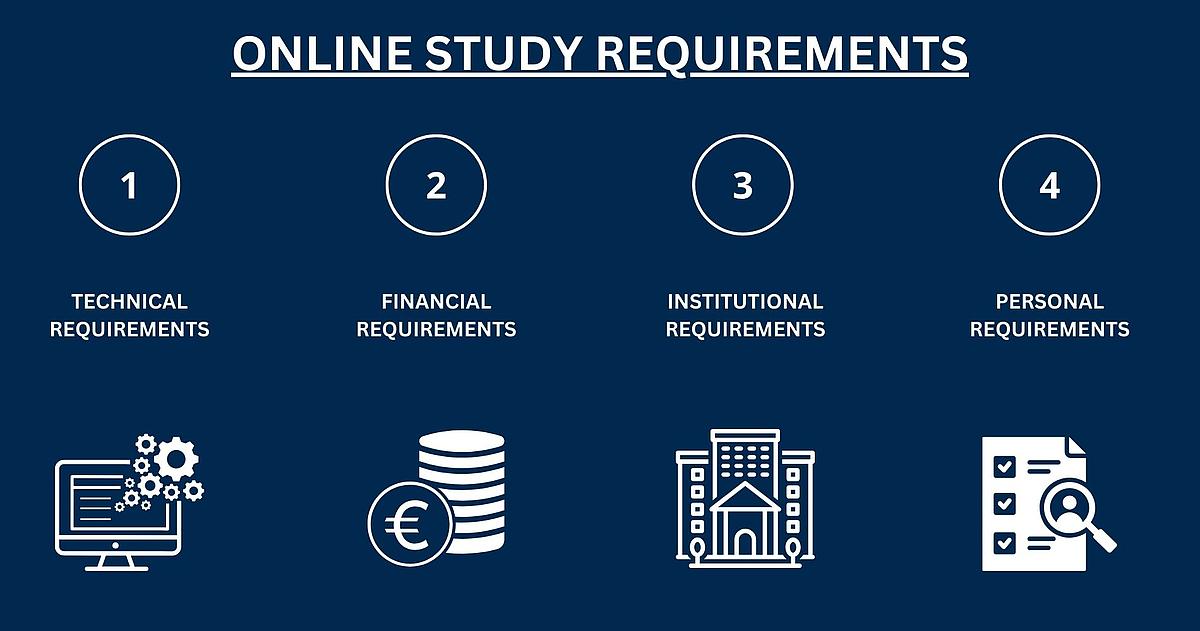This Website uses cookies to improve your visit on our website. More Info
Online Study: Does this work?
In today's digital era, online study, also known as distance learning, is becoming increasingly important. It gives learners all over the world access to high-quality educational opportunities, regardless of their location. But what exactly does the term "online study" mean? In this explanatory article, we shed light on the basic concepts and structures of online study.What is online study?
Online study is a form of higher education in which most or even all of the teaching takes place online. In contrast to traditional face-to-face study, where students have to be physically present at a university, online students can access their courses and learning materials digitally, regardless of their location.
Features of an Online Degree Program
- Digital Learning Platforms: Teaching takes place via special online platforms that provide lectures, seminars, discussions and other teaching materials.
- Flexibility: Students can usually decide for themselves when and where they learn. This is particularly advantageous for working people, parents or people who live far away from educational institutions.
- Multimedia Content: Learning content is often offered in various formats such as videos, podcasts, interactive modules and e-books to make learning more varied.
- Virtual Interactions: Communication and interaction with lecturers* and fellow students* takes place via email, forums, video chats and other digital means of communication.
- Online Examinations: Exams and tests are also frequently conducted online, often using special software solutions to ensure integrity and fairness.
In summary, it can be said that online studies are a flexible alternative to traditional face-to-face studies, but they also require a high degree of self-organization and technical know-how.
Advantages and Disadvantages of Studying Online
This table provides a clear overview of the different aspects of online study that can be both beneficial and challenging.
| Advantages | Disadvantages |
|---|---|
| Flexibility: Students can determine their own learning times and adapt them to their own schedule. | Self-discipline required: Students must be able to motivate themselves and manage their time effectively. |
| Location independence: Learning content is accessible from anywhere as long as there is an internet connection. | Technical problems: A stable internet connection and technical equipment are necessary; technical problems can disrupt the learning process. |
| Cost efficiency: Often lower costs for travel, accommodation and meals; sometimes also lower tuition fees. | Less social interaction: Direct personal contact with fellow students and lecturers is reduced. |
| Individual learning pace: Students can learn at their own pace and repeat content if necessary. | Lack of practical experience: In some subjects, it can be difficult to substitute practical experience and lab work. |
| Wide range of courses and programs: Access to a variety of degree programs and specialized courses that may not be available locally. | Recognition and acceptance: Some employers and institutions may value online degrees less. |
| Diverse learning materials: Use of multimedia content such as videos, interactive modules and online forums enriches learning. | Distractions at home: The home learning environment can be full of distractions, making it difficult to concentrate. |
| Extensive support and resources: Access to online libraries, databases and technical support. | Limited practical application: Certain practical skills and lab work can be difficult to teach online. |
| Environmentally friendly: Reduced need for travel and printed materials saves the environment. | Zeitverschiebung und Kommunikationsprobleme: Bei internationalen Programmen können Zeitverschiebungen die Kommunikation erschweren. |
How does online study work?
Online study works through the use of digital technologies and platforms that enable educational content to be delivered over the internet. Here are the basic steps and components that make up online study:

- Registration and enrollment:
- Interested students register with a university or educational institution that offers online degree programs.
- After admission, enrollment in the desired degree program takes place.
- Access to learning platforms:
- Once enrolled, students are given access to a digital learning platform, often a Learning Management System (LMS) such as Moodle, Blackboard or Canvas.
- This platform serves as a central point of contact for all course materials, communication and administration.
- Use of learning materials:
- Course content is provided in a variety of formats, such as video lectures, PDFs, interactive modules and e-books.
- Students can download these materials or view them directly on the platform.
- Interactive teaching methods:
- Live webinars and virtual classrooms make it possible to follow lectures and seminars in real time and interact with lecturers and fellow students.
- Discussion forums and group work promote exchange and collaboration among students.
- Assignments and exams:
- Assignments and projects are submitted via the learning platform.
- Exams can either be taken online, often with special software solutions for monitoring, or at specific exam centers.
- Communication and support:
- Students can communicate with lecturers and fellow students via email, chats, video calls and forums.
- Many institutions also offer technical support and advice to help students with technical problems or questions about their studies.
- Self-organization and time management:
- As online study offers a lot of flexibility, students need to plan their own learning workload and motivate themselves.
- However, most courses have fixed deadlines and examination periods that must be adhered to.
- Degree and certificates:
- After successfully completing the required modules and examinations, students receive an academic degree, e.g. Bachelor's, Master's or a certificate, depending on the course.
Requirements for studying online
In order to successfully participate in an online course of study, certain requirements must be met, both technical and personal. Here are the most important requirements in detail:
Overview: Online study requirements
The following graphic provides a brief overview of the general online study requirements that you should be aware of.

Explanation: Online study requirements
Successful online study requires a combination of the right technical equipment, personal skills and support from the educational institution. Examples of the individual general online study requirements are named and explained below.
Technical Requirements
- Computer or laptop:
- A powerful computer or laptop is required to access the learning platforms and digital materials.
- Internet connection:
- A stable and fast internet connection is essential to stream videos, participate in live webinars and download large files.
- Software:
- Common programs such as an up-to-date web browser (e.g. Chrome, Firefox), PDF reader and office applications (e.g. Microsoft Office, Google Docs) should be installed.
- Specific software for certain degree programs or exam monitoring tools may also be required.
- Headset and webcam:
- A good headset (headphones with microphone) and webcam are important for participating in virtual meetings and webinars.
- Learning platform access:
- Access details to the particular learning platform (e.g. Moodle, Blackboard, Canvas) used by the educational institution.
Financial Requirements
- Tuition fees:
- Students should find out about the costs of studying online and make sure they can afford them.
- Additional costs:
- Additional costs for special software, books or examination fees should be planned for.
Institutional Requirements
- Recognized educational institution:
- The institution chosen should be accredited and recognized to ensure that the degree is recognized.
- Access to resources:
- The institution should provide access to digital libraries, online databases and other learning resources.
- Supervision and support:
- There should be sufficient faculty and technical support to assist with questions and problems.
Personal Requirements
- Self-discipline and time management:
- Since online degree programs offer a high degree of flexibility, students must be able to plan their time effectively and be self-motivated.
- Basic computer skills:
- Knowledge of computers and the internet is necessary to be able to use the various digital tools and platforms efficiently.
- Organizational skills:
- The ability to organize learning materials, track deadlines and submit assignments on time is critical.
- Communication skills:
- Good written communication skills are important as a lot of communication is done via email, forums and chats.


Important Terms related to
Online Study

Terms related to the online study program
| Term | Explanation |
|---|---|
| Learning Management System (LMS) | A software platform used to provide course materials, manage assignments and facilitate communication between students and teachers (e.g. Moodle, Blackboard). |
| Webinar | An online seminar or lecture held in real time over the internet, often with interaction features such as Q&A. |
| Asynchronous learning | Learning format in which students can work on learning materials and tasks at their own pace and at their own time, without simultaneous interaction with teachers. |
| Synchronous learning | Learning format in which teachers and students are online at the same time and interact in real time, for example through webinars or virtual classrooms. |
| Virtual classroom | An online space in which synchronous teaching takes place, often with tools for presentations, chats and group work. |
| MOOC | Massive Open Online Course; an online course that is open to a large number of participants and is usually offered free of charge. |
| Discussion forum | An online platform where students and lecturers can discuss topics, ask questions and exchange information. |
| Tutorial | An accompanying course, often in smaller groups, which serves to deepen the learning material and is led by tutors. |
| E-portfolio | A digital collection of work and evidence that documents a student's progress and achievements. |
| Open Educational Resources (OER) | Free learning and teaching materials that are available free of charge and can be reused and adapted. |
| Blended learning | An approach to learning that combines online and face-to-face teaching to take advantage of both methods. |
| Proctoring | Monitoring of online exams through specialized software or live observation to ensure the integrity of the exam. |
| Flipped classroom | A teaching concept in which students work on the learning content at home and use the classroom time for in-depth activities and discussions. |
| E-tutoring | Online support from tutors who help with questions and problems and offer individual learning support. |
| Cloud computing | Use of online services and storage solutions to store and collaborate on learning materials and projects. |
| Gamification | Use of game-like elements in learning environments to increase student motivation and engagement. |
| Learning analytics | Analysis of learning data to understand learning behavior and adapt teaching individually. |
How is learning content taught in the online course?
In online studies, learning content is taught using a variety of digital methods and tools in order to offer students a comprehensive and interactive learning experience. Here are the most important methods of content delivery:

- Video lectures
- Recorded lectures: Lecturers record their lectures and make them available to students as videos. These can be viewed at any time and repeated if required.
- Live webinars: Real-time lectures where students can participate live, ask questions and interact. These sessions are often recorded so that they can be watched again later.
- Digital scripts and e-books
- PDF documents: Lecturers provide lecture notes, academic articles and other text documents in PDF format.
- E-books: Access to digital books, either via the university's online library or via special e-book platforms.
- Interactive modules and learning software
- E-learning modules: Interactive learning modules that combine multimedia elements such as texts, videos, animations and quizzes to make the learning material easier to understand.
- Simulations and virtual labs: Virtual labs and simulations can be used to carry out experiments and practical exercises digitally, particularly in science subjects.
- Discussion forums and group work
- Online forums: Platforms where students can hold discussions, ask questions and receive answers from lecturers or fellow students.
- Virtual group projects: Collaboration in virtual teams via video conferencing, shared document editing tools (e.g. Google Docs) and project management software.
- Self-study materials and assignments
- Worksheets and exercises: Regular tasks and exercises that must be completed independently and submitted for assessment.
- Self-tests and quizzes: Automated tests and quizzes for self-testing and consolidation of knowledge.
- Online libraries and databases
- Digital libraries: Access to a wide range of academic articles, books and databases licensed specifically for students.
- Subject portals: Specialized portals that provide industry-specific information and research results.
- Communication tools
- E-mail: Direct communication with lecturers and fellow students.
- Chats and messenger services : Faster and often more informal communication channels for exchange within courses or groups.
- Learning management systems (LMS)
- Centralized platforms: Systems such as Moodle, Blackboard or Canvas provide a single point of contact for all learning activities, from the provision of materials and the submission of assignments to grade overviews and feedback.
- Online tutorials and consultation hours
- Virtual tutorials: Regular sessions with tutors who go into the material in more depth and help with questions.
- Consultation hours via video chat: Opportunity to discuss individual questions directly with lecturers or tutors.
Comparison: Online study and classroom study
This table provides a comprehensive overview of the differences between online study and traditional face-to-face study, highlighting the specific advantages and disadvantages of each.
| Criterion | Online study | Traditional classroom study |
|---|---|---|
| Location | Flexible, possible from anywhere with internet access | At a fixed location, usually on a university campus |
| Time planning | Flexible time planning, asynchronous learning possible | Fixed timetable, synchronous teaching |
| Interaction with lecturers and fellow students | Primarily online via forums, emails, chats and video conferences | Direct personal contact in lectures, seminars and consultation hours |
| Learning materials | Digital materials, videos, e-books, online modules | Physical books, scripts, handouts, laboratory equipment |
| Learning environment | Home environment, self-selected learning locations | Classrooms, lecture halls, laboratories, libraries |
| Technical requirements | Computer, stable internet connection, specific software | Less dependent on technology, mostly basic requirements |
| Self-discipline | High level of self-discipline and self-motivation required | More structured daily routine due to fixed timetables |
| Social interaction | Less direct social contact, more virtual communication | Intensive social interaction and networking on site |
| Practical exercises | Virtual labs, simulations, often less practical experience | Direct access to labs, workshops and other practical facilities |
| Flexibility | High flexibility in time and location | Less flexibility, fixed times and locations |
| Costs | Often cheaper, fewer additional costs such as travel, accommodation | Higher total costs due to tuition fees, travel, accommodation, meals |
| Supervision and support | Online support, technical and academic help via digital channels | Personal support from lecturers, tutors and local advice centers |
| Recognition | Depends on institution and degree program, sometimes less recognized | Generally high recognition, especially at established universities |
| Examinations | Online examinations, some with proctoring | Supervised face-to-face examinations |
| Access to resources | Digital libraries and databases | Physical libraries, lab equipment and other resources on site |
| Lifestyle | Integration into everyday personal life, often parallel to work or family | Often full-time commitment, greater separation of work and study |
Are there also attendance phases in the online course?
Some online degree programs also include attendance phases, which can often depend on specific subjects. These programs combine online learning with short, intensive attendance phases and thus offer a hybrid form of learning. Here are some reasons for and examples of attendance phases in online study programs:
Reasons for attendance phases
- Practical exercises: Practical labs and exercises are required in subjects such as engineering, healthcare or science.
- Exams: Some exams are held on site for safety and accreditation reasons.
- Networking: Attendance phases offer the opportunity to get to know lecturers and fellow students personally and to build professional networks.
- Workshops and seminars: Interactive and intensive learning formats such as workshops and seminars can be conducted more effectively in presence.
- Project work: Group projects and presentations often benefit from face-to-face collaboration.
Examples of attendance phases
- Block seminars: Multi-day seminars that take place once or several times a semester.
- Internships: Practical phases in companies or laboratories that are integrated into the degree program.
- Examination dates: Final examinations or intermediate examinations taken at an examination center.
- Introductory events: Orientation days or weeks at the beginning of the course.
Advantages of attendance phases
- Intensive exchange: Direct contact and intensive exchange with lecturers and fellow students.
- Practical relevance: Opportunity to learn and apply practical skills.
- Motivation and discipline : Fixed dates can help to increase motivation and discipline to study.
Conclusion
Presence phases in online studies offer a valuable addition to digital learning and contribute to the quality and holistic nature of the training. They enable practical experience and personal interaction without completely sacrificing the flexibility of online study.
Studying online very often fails due to self-discipline and concentration. Especially if you want to study part-time alongside your job, it is a great challenge to find the time and motivation to study after work. Online studies should therefore be carefully considered and possibly planned.
As an alternative, we recommend the Munich Business School face-to-face study programs. Located in the heart of the economic powerhouse of Munich, MBS offers some excellent international business degree programs in German and English.

Organization and support
in Online Studies

Organization and support in online studies
| Measure | Example | Explanation |
|---|---|---|
| Learning management systems (LMS) | Central platform | An LMS such as Moodle, Blackboard or Canvas serves as a central point of contact for all learning activities. |
| Course administration | Lecturers can create courses, upload materials, set assignments and award grades. | |
| User management | Manage student enrollment, course assignment and progress tracking. | |
| Course structure | Module-based structure | Courses are divided into modules or weekly sections, each covering specific topics and tasks. |
| Clear schedules | Publication of schedules that include important dates for assignments, exams and webinars. | |
| Communication channels | Forums and chats | Discussion forums and chat rooms for exchange between students and lecturers. |
| Regular updates and announcements via email. | ||
| Provision of materials | Digital resources | Provision of lecture videos, PDFs, e-books and interactive modules via the LMS. |
| Access to libraries | Online libraries and databases for academic research. | |
| Academic support | Tutorials | Regular virtual tutorials or consultation hours in which tutors or lecturers answer questions and expand on material. |
| Mentoring programs | Assignment of mentors who accompany and support students throughout their studies. | |
| Technical support | Helpdesk | A technical helpdesk that helps with problems with the learning platform, software or hardware. |
| Instructions and FAQs | Detailed instructions and FAQs on the learning platform covering frequently asked questions and problems. | |
| Administrative support | Student advisory service | Advice on study planning, course selection and organizational issues. |
| Examination Office | Administration and support with exam registrations, deadlines and theses. | |
| Psychosocial support | Counseling centers | Access to psychosocial counseling centers for support with personal or study-related problems. |
| Online workshops | Workshops on topics such as stress management, time management and learning strategies. | |
| Technological tools for support | Ticket systems | Management of support requests through a ticket system that allows requests to be tracked and processed efficiently. |
| Video conferencing tools | Use of tools such as Zoom, Microsoft Teams or Skype for virtual meetings, office hours and group work. | |
| Collaborative software | Use of platforms such as Google Docs or Microsoft OneDrive for the joint processing of documents and projects. |
Procedure of an exemplary online study program
A sample online degree program schedule may vary by institution and program, but generally follows a structured plan that allows for student flexibility and self-discipline. Here is a typical semester schedule for an online degree program:
During the semester
Weekly course schedule:
- Monday:
- Posting of course materials: the materials for the week, including lectures, reading lists, assignments and discussion questions, are posted on the learning platform.
- Planning and Organization: students plan their week and organize their time to complete upcoming assignments and readings.
- Tuesday through Thursday:
- Independent learning : students work independently on the materials provided. This may include watching lecture videos, reading articles or completing exercises.
- Discussion forums: Participate in online discussions with fellow students and lecturers to clarify questions and explore topics in depth.
- Friday:
- Live webinar: Participate in a live webinar or virtual lecture where lecturers summarize the week, answer questions and lead discussions.
- Group work: Virtual meetings with project groups to work on common tasks.
- Weekend:
- Submit assignments: Completion and submission of weekly assignments or projects via the learning platform.
- Review and preparation: Review of the week and preparation for upcoming topics and tasks.
Monthly course schedule:
- End of the month:
- Intermediate exams or tests: participation in online exams or tests to assess learning progress to date.
- Feedback: Receive feedback on submitted tasks and tests to optimize your own learning process.
End of semester
- Final projects and exams:
- Final exams: Conduct final exams that are either proctored online or taken at special exam centers.
- Final projects: Submission of major projects or final papers developed during the semester.
- Grading and feedback:
- Receiving grades: Students receive their grades and evaluations for courses.
- Feedback session: Participation in feedback sessions or evaluations to reflect on one's own performance and make suggestions for improvement.
Semester break
- Recovery and preparation:
- Recovery: time to relax and recharge your batteries after an intensive semester.
- Preparing for the next semester: planning and registering for the next courses, purchasing teaching materials if necessary.
Similar Study Guide Topics:
What should I study?
Study Strategies
Study Scholarship
Learning Types
Writing a Term Paper
FAQ
With an online marketing degree, you can work in various areas of the digital economy. Alumni can take on positions as digital marketing managers, social media managers, SEO specialists, content managers or e-commerce managers. They are able to develop and implement digital marketing strategies, plan online advertising campaigns, manage social media channels, carry out website optimizations for search engines and create data analyses to measure the success of marketing measures. They can also work in consulting, where they support companies with digital transformation and the implementation of online marketing strategies.
There are a variety of online degree courses in different subject areas.
In the field of business and management, you can study business administration, marketing, finance and human resource management. Information technology offers courses such as computer science, software development, cybersecurity and data science. In healthcare, there are health management, nursing sciences and public health. Social sciences include psychology, sociology, political science and social work. Humanities include history, philosophy and literature. Natural sciences include biology, chemistry and environmental sciences. Engineering includes mechanical engineering, electrical engineering and civil engineering. Education includes pedagogy and educational science. Law offers programs in jurisprudence and business law. Art and Design includes Graphic Design and Interior Design. Communication and media offer journalism and media studies. In addition, there are specialized courses such as tourism management, sports management and event management as well as certificate and continuing education courses in project management and language courses.
An online course can be recognized in the same way as a traditional face-to-face course, provided it is offered by an accredited and reputable institution and meets the quality standards and regulatory requirements of the country in question. Students should find out about the accreditation of the institution and the program as well as the recognition regulations in their respective country or professional field before enrolling.
Studying online can be expensive due to the high development costs of digital learning platforms and materials, ongoing technical maintenance, as well as paying lecturers and support teams to provide personalized assistance.
Studying online can be difficult as it requires a high degree of self-discipline, self-motivation and time management. The lack of direct interaction with lecturers and fellow students can present additional challenges. Students must also be able to cope with technical demands and possible distractions at home. The difficulty also depends on the respective subject area, motivation and individual learning ability.
Interested in studying? Request our information material now!
More exciting degree programs in Munich













